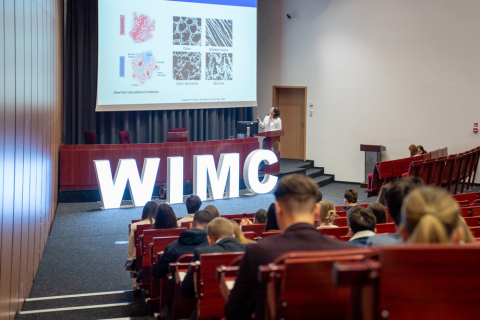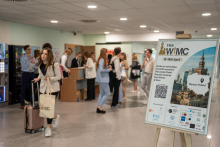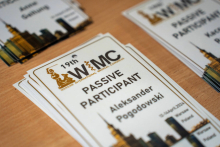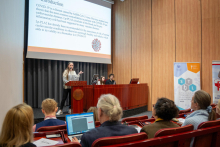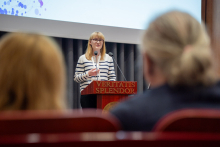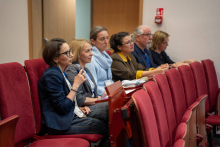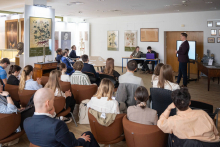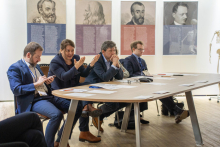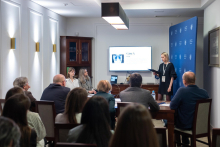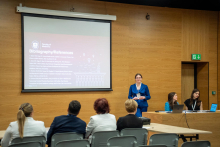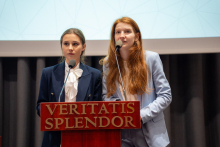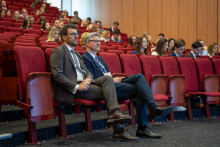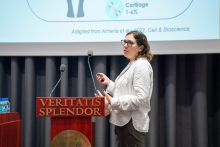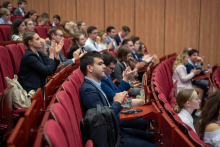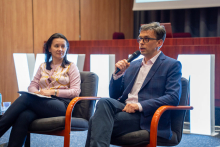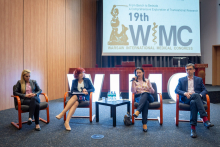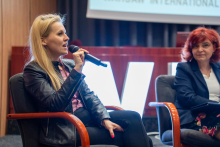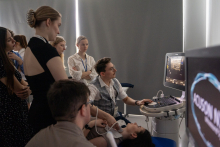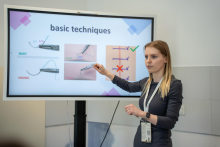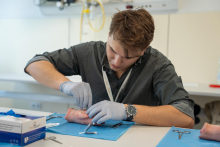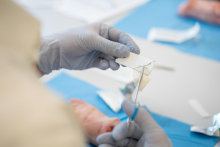This year’s Warsaw International Medical Congress for Young Scientists was held on April 12-14. It was organized by students from the Student Scientific Society of the Medical University of Warsaw with support from the university. This year’s congress enjoyed high attendance – over 450 participants registered to participate.
Young scientists about their research
Passion for science, willingness to exchange ideas and take up new challenges – this is what drives young researchers who decide to present their research achievements during the symposium to a jury consisting of experts from various fields. Such a presentation is a big challenge – exciting and stressful at the same time. This year, over 300 people picked up the gauntlet.
“I think it is important for young people to engage in science and understand its mechanisms,” emphasized Magdalena Justyniarska, President of Student Scientific Society of the Medical University of Warsaw. And she added: “Such testing of one’s work, understanding of what one is doing and the ability to present results is something that is extremely useful in scientific work.”
The participants could present their works in selected thematic areas. There were as many as 30 of them and included, among others, oncology, psychiatry, radiology, pharmacy, and physiotherapy. The works were assessed in the following categories: method of presentation, substantive values, attractiveness of the topic, independence of work. The best works in each area were selected and awarded during the official finale of the conference. The full list of winners will be available on the Warsaw International Medical Congress website.
Workshops
The hosts provided participants with an opportunity to participate in over 30 workshops. There they acquired practical skills under supervision from representatives of student research groups operating at the university.
What offers could they take advantage of?
For example, a workshop with SKN Le Fort during which various types of splints and methods of treating fractures caused by road and sports accidents were introduced.
Students from SKN Vena demonstrated how to perform carotid endarterectomy, a treatment method involving the surgical removal of atherosclerotic plaques from the lumen of the vessel, and how to close an artery using vascular grafts and suture the skin. The participants worked on models used in the training of vascular surgeons around the world.
Participants of the workshop with SKN ANKONA A could learn what point-of-care ultrasonography (POCUS) is and why its use can improve patient care, especially in emergency cases.
Expert lectures
Expert lectures are also an integral part of the event. This is not only a large dose of professional knowledge but also an inspiration for young scientists to continue their professional growth. And also proof that biomedicine is constantly developing and there is still a lot to discover.
This year, Dr. Katarzyna Leszczyńska from M. Nencki Institute of Experimental Biology of the Polish Academy of Sciences spoke about the role that tumor hypoxia plays in resistance to therapy, and Prof. Wiesław Jędrzejczak, former long-time Head of the Department and Clinic of Hematology, Oncology and Internal Diseases of the University Clinical Center of the Medical University of Warsaw, gave a lecture showing the path from hematopoietic stem cell transplantation to the CAR-T cell therapy.
New in the agenda of the Warsaw International Medical Congress: a debate on translational medicine
The discussants were: Habilitated Doctor Tomasz Rygiel from the Section of Immunology of the Institute of Experimental and Clinical Medicine of the Polish Academy of Sciences, Cellis Chief Scientific, doctor of pharmaceutical sciences; lawyer Małgorzata Kubacka from the Section of Applied Pharmacy; Prof. Iwona Ługowska, Head of the Early Phases Research Department of the National Institute of Oncology; and Doctor of pharmaceutical sciences Karolina Maria Nowak, MBA, Director of the Department of Innovation and Biotechnology Development at the Medical Research Agency.
“Today we set out on a journey to transform scientific discoveries into real solutions for patients,” began Magdalena Justyniarska, who led the debate. “Our panelists are here to showcase their knowledge and insights, creating a truly informative discussion on translational medicine.”
What did the interlocutors pay attention to?
Habilitated Doctor Tomasz Rygiel emphasized that for many scientists it is very difficult to realize that laboratory discoveries may have actual clinical applications:
“The challenge for them is to think about the end-use of their discovery and ask questions: why am I doing it, who may be interested in it, who can benefit from it, and a more difficult and unusual question – whether it can be a product.” These questions should be asked at the very beginning of planning the study.
Prof. Iwona Ługowska pointed out the same thing:
"The biggest challenge is to see the effects at the level of basic research and ask yourself the question” what about the patient?”
Dr. Karolina Nowak emphasized that sometimes it is very difficult to achieve the success of a planned study, especially since most biomedical research involves high risk, but – which should always be remembered – even failure is accompanied by something valuable: learning and gaining new knowledge.
Issues of research financing, regulation of procedures and cooperation between the scientific community and business were also discussed during the debate.
Summary of th Warsaw International Medical Congress
“We are proud that once again we have managed to organize such a large event, which offers an incredible opportunity for networking,” emphasized Magdalena Justyniarska. “We have the prospect of an even better event next year. This will be the 20th anniversary edition of the Warsaw International Medical Congress for Young Scientists, to which we cordially invite you today.”
Prof. Zbigniew Gaciong, one of the event’s patrons, also drew attention to the importance of the congress, writing in a letter to the hosts:
“We are very proud that an internationally recognized academic scientific event has once again made the Medical University of Warsaw a place of unique meeting for people of science: from those who are taking their first steps in medical science, to outstanding, experienced researchers and academic teachers from all over the world.”
The university authorities were represented at the congress by Prof. Piotr Pruszczyk, Vice-Rector for Science and Technology Transfer, and Prof. Paweł Włodarski, Vice-Rector for internationalization, promotion and development.
